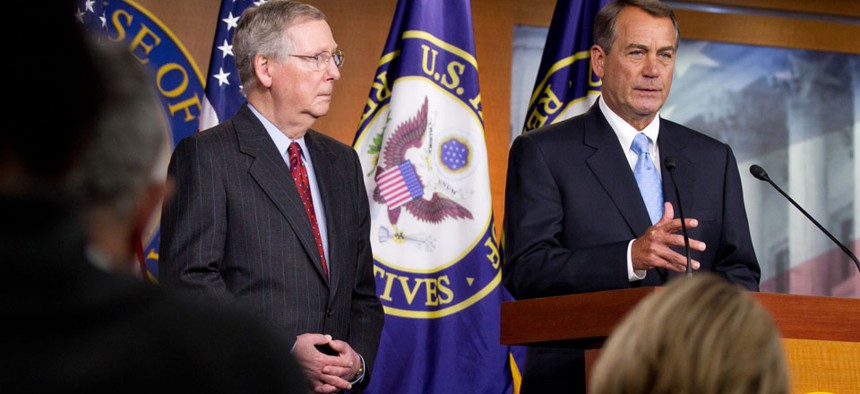
Office of The Speaker of the House
Actually, the Elections Were About Making Government Work
But can Republicans deliver on that promise?
Republicans are in an an ebullient mood this week, having exceeded their own electoral expectations by taking over the majority in the Senate and padding their advantage in House seats.
You might expect that this would unleash the firebrand side of the GOP, with renewed talk of slashing and burning the federal establishment and forcing President Obama to back down on efforts to expand government’s scope in areas ranging from health care to immigration.
But it’s remarkable how little of such rhetoric has been floating around. What we haven’t heard this week--at least not much, anyway--is much discussion of slashing the bureaucracy, deeply cutting agency budgets and shutting down government if Obama puts up any resistance.
That, says Republican pollster Frank Luntz, is because the election results were not an endorsement of a Republican revolution, but a plea on the the part of Americans for Washington to get things done. Writing in the New York Times, Luntz said the elections “were less about the size of government than about making government efficient, effective and accountable.”
That means, first and foremost, not simply throwing sand in the gears of the process. Here’s what presumptive Senate Majority Leader Mitch McConnell, R-Ky., had to say in an interview interview with Time about whether there would be a government shutdown this fall: “No. There is no possibility of a government shutdown. Remember me? I’m the guy that gets us out of government shutdowns.”
Instead, what Republicans are talking about is governing. The week before the election, House Budget Committee Chairman Paul Ryan, R-Wis., told the Washington Post, “Those tactics [during the shutdown] didn’t work. If we’re going to win, it’s going to be because of ideas. We’ve got to build that movement and have a governing temperament.”
Even when McConnell was in the heat of his hard-fought reelection campaign and threatening to confront Obama if the GOP regained control of the Senate, he focused on the issue of what government was doing and how it was doing it. “We’re going to pass spending bills, and they’re going to have a lot of restrictions on the activities of the bureaucracy,” McConnell told Politico in August. “That’s something he won’t like, but that will be done. I guarantee it.”
Today, in an op-ed in the Wall Street Journal, McConnell and House Speaker John Boehner, R-Ohio, pledged, among other things, to take up the issue of “an antiquated government bureaucracy ill-equipped to serve a citizenry facing 21st-century challenges, from disease control to caring for veterans.”
That may sound confrontational, but it also leaves a lot of room for reaching across the aisle to craft effective solutions. In the immediate aftermath of the elections, the president seemed amenable to working together with Republicans on improving government. At his press conference yesterday, Obama said that in his last two years in office, he would focus on “simple things, like how do we make customer service better in every agency? Or the things that we can do to -- to streamline, you know, how our veterans access care? Are there better ways that we can make businesses understand the programs that are available to them to promote their business or exports?”
“There’s going to be opportunities to work with Democrats and Republicans on Capitol Hill to get laws done,” Obama added.
The question is whether the divided government Americans just endorsed will be able to make that bureaucracy work any more effectively than the slightly-less-divided government we’ve had for the past few years. Certainly, we can expect hearings, hearings and more hearings on oversight of agencies aimed at exposing waste and inefficiency.
More important will be to see what comes next. Improving government entails substantive, gritty work on overhauling systems ranging from personnel to procurement. There’s substantial opportunity for bipartisan reform in these areas. But it’s a largely thankless task that doesn’t traditionally translate into electoral success.
NEXT STORY: John Lennon and GAO’s High Risk List







